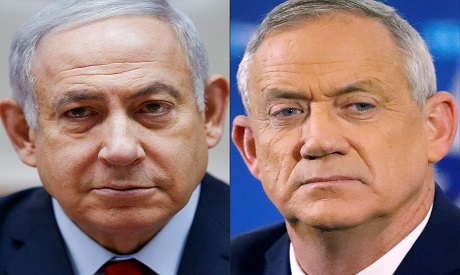
File photo: This file combo image created on April 2, 2019 shows Israeli Prime Minister Benjamin Netanyahu (L) attending the weekly cabinet meeting at the Prime Minister's office in Jerusalem on December 9, 2018 and retired Israeli general Benny Gantz, one of the leaders of the Blue and White (Kahol Lavan) political alliance, at a press conference in Tel Aviv on April 1, 2019. (AFP)
Negotiators for Israel’s two largest parties began discussing on Tuesday the possibility of forming a unity government, part of a long-shot effort to break the political deadlock following last week’s national elections.
Late Monday, Israeli President Reuven Rivlin summoned Prime Minister Benjamin Netanyahu and his election rival, Benny Gantz.
Rivlin said the two leaders had taken "a significant step" towards forming a unity government, BBC cited.
Last week's general election -- the second this year -- ended in deadlock.
The Israeli president said he would do everything he could to avoid a third general election this year.
"We took a significant step this evening, and now the main challenge is building a direct channel of communication out of trust between the two sides," Rivlin told the two rivals. "People expect you to find a solution and to prevent further elections, even if it comes at a personal and even ideological cost."
Israel’s president is constitutionally responsible for nominating a prime minister after national elections.
When Rivlin makes his choice, that candidate will have up to six weeks to form a governing coalition.
If negotiations prove unsuccessful, Rivlin could give the nod to the other candidate to make an attempt. If neither candidate is successful, another round of elections would be triggered.
But neither Netanyahu's Likud Party nor the centrist Blue and White Party secured enough seats with their allies to form a majority.
Israeli media reported that the Blue and White party won 33 out of 120 parliamentary seats; Likud had 31.
With smaller allied parties, a total of 55 lawmakers have thrown their support behind Netanyahu, against 54 for Gantz, leaving both men short of the required 61-seat majority, AP said.
The Joint List, the bloc of Arab parties that came in third by 13 seats, says it wants to oust Netanyahu from power.
Ayman Odeh, leader of the Joint List, told the Israeli president that his alliance's priority was to prevent Netanyahu from serving another term.
Odeh told BBC it wasn't endorsing Gantz and his polices: but was moving to try and block Netanyahu from securing another term, and to send a clear message that Israel's future must include the full and equal participation of its Palestinian citizens.
This is the first time since 1992 that an Arab political group has issued an endorsement for prime minister.
This result, the third largest force in the legislature, is a significant exercise of political power by Israel's Arab citizens, said Barbara Plett-Usher, the BBC Middle East correspondent.
Their support will not give Gantz and his Blue and White alliance a majority, but it will give him a boost in negotiations about who gets the first chance to form the government, said Plett-Usher.
No party drawn from the 21 percent Arab minority has ever been part of an Israeli government.
Netanyahu blasted the Arab party's support for Gantz, saying Israelis were now faced with two choices: "a minority government that leans on those that reject Israel as a Jewish, democratic state," or a "broad national government" composed of his and Gantz's parties.
A unity deal between the large parties, with a rotating leadership, is seen as perhaps the only way out of the gridlock. That’s what Avigdor Lieberman, the leader of the ultra-nationalist Yisrael Beitenu Party, is insisting upon, AP said.
Lieberman, who controls eight seats, has refused to endorse either candidate and is demanding they join him in a broad, secular unity government that excludes the ultra-Orthodox parties, with 17 seats, Netanyahu’s long-time partners.
Analysts believe Lieberman gained two of his eight seats by draining votes from Likud -- from right-wing voters who put their secular identity above their loyalty to Netanyahu, BBC said.
It is going to be very hard to form a government based on the two larger parties, when one of them drags its satellite parties along with it, said AP.
Short link: